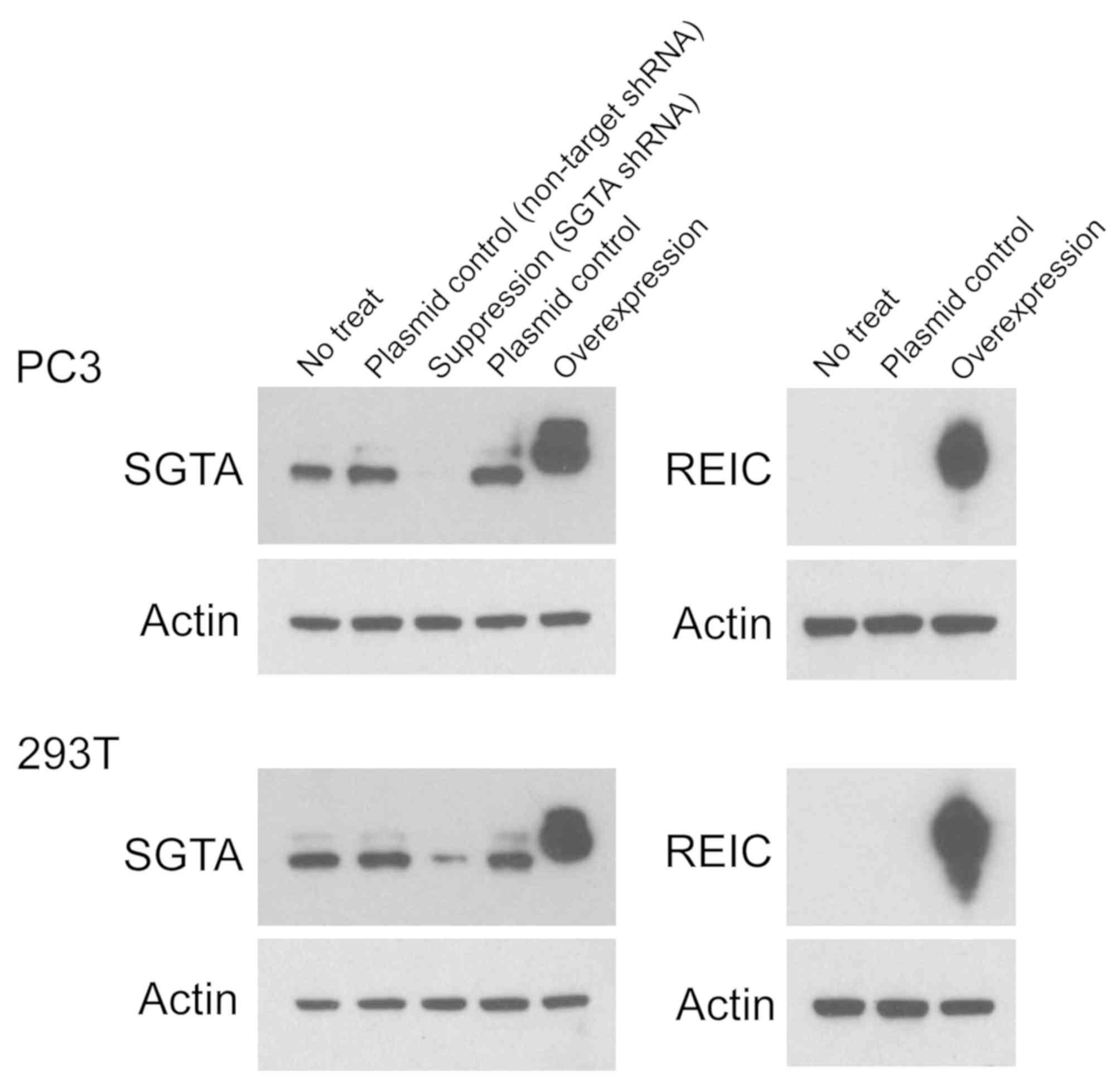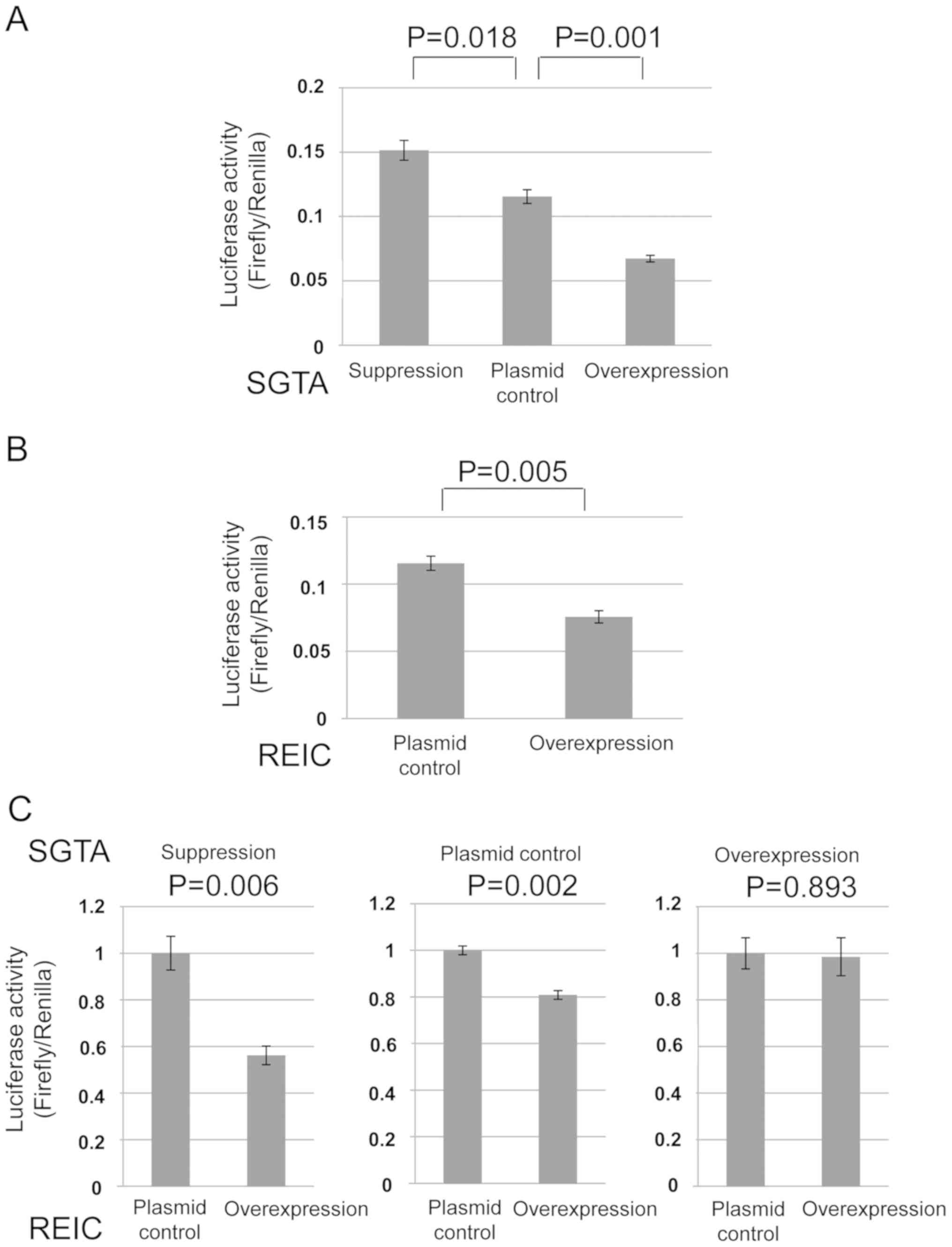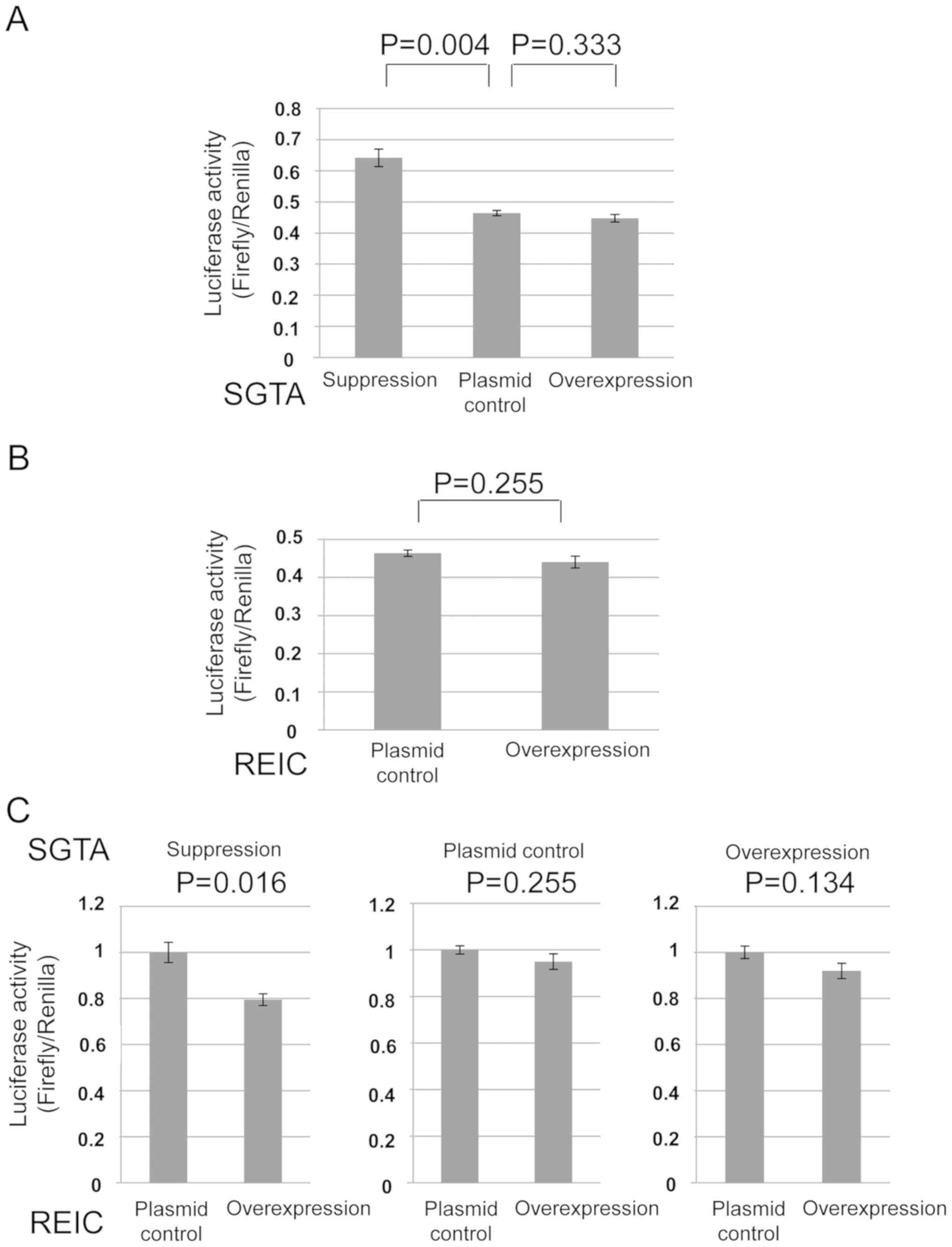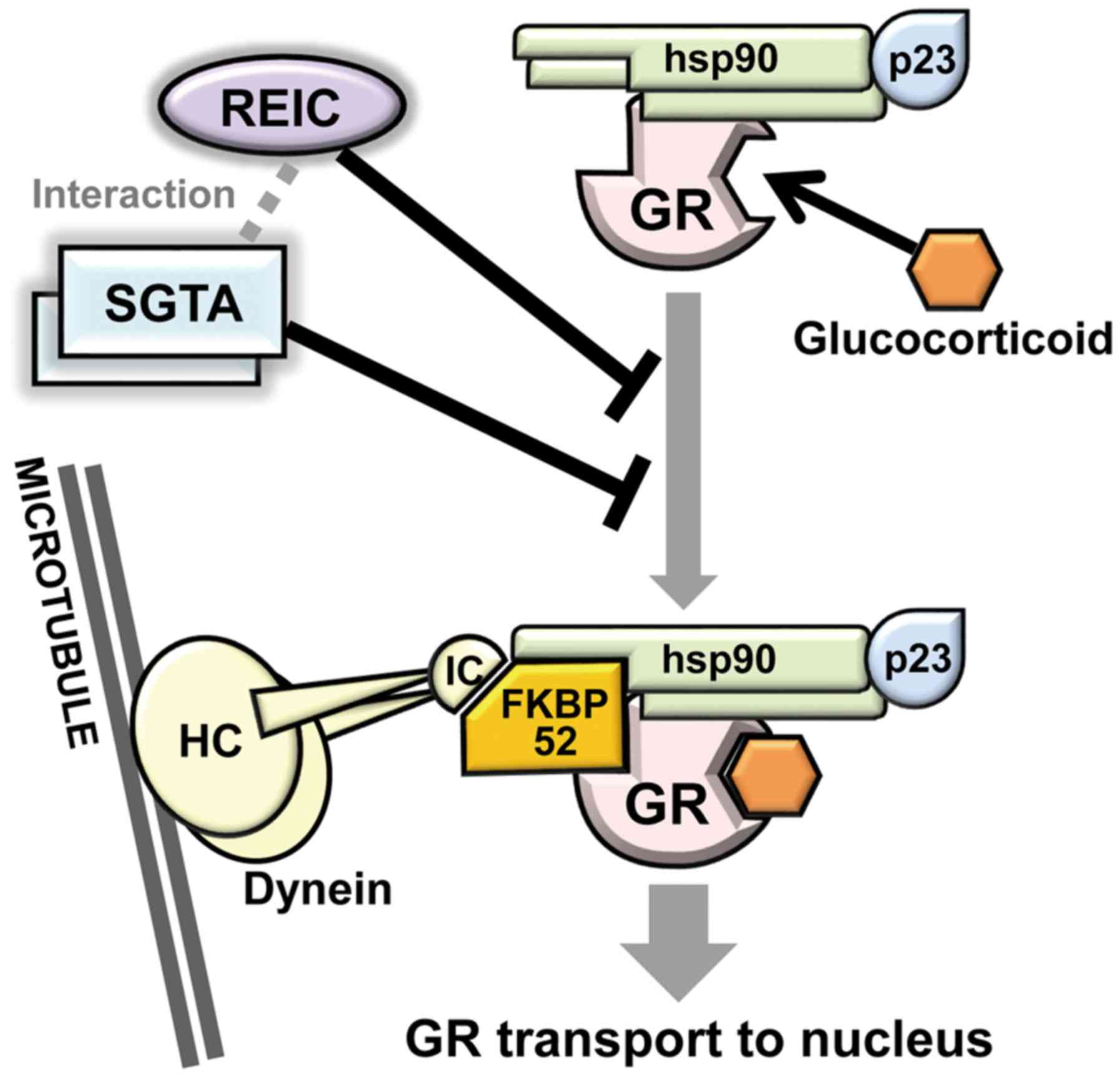|
1
|
Shiota M, Fujimoto N, Kashiwagi E and Eto
M: The role of nuclear receptors in prostate cancer. Cells.
8(602)2019.PubMed/NCBI View Article : Google Scholar
|
|
2
|
Shiota M and Eto M: Current status of
primary pharmacotherapy and future perspectives toward upfront
therapy for metastatic hormone-sensitive prostate cancer. Int J
Urol. 23:360–369. 2016.PubMed/NCBI View Article : Google Scholar
|
|
3
|
Kim JY, Yu J, Abdulkadir SA and
Chakravarti D: KAT8 regulates androgen signaling in prostate cancer
cells. Mol Endocrinol. 30:925–936. 2016.PubMed/NCBI View Article : Google Scholar
|
|
4
|
Thadani-Mulero M, Portella L, Sun S, Sung
M, Matov A, Vessella RL, Corey E, Nanus DM, Plymate SR and
Giannakakou P: Androgen receptor splice variants determine taxane
sensitivity in prostate cancer. Cancer Res. 74:2270–2282.
2014.PubMed/NCBI View Article : Google Scholar
|
|
5
|
Korpal M, Korn JM, Gao X, Rakiec DP, Ruddy
DA, Doshi S, Yuan J, Kovats SG, Kim S, Cooke VG, et al: An F876L
mutation in androgen receptor confers genetic and phenotypic
resistance to MDV3100 (enzalutamide). Cancer Discov. 3:1030–1043.
2013.PubMed/NCBI View Article : Google Scholar
|
|
6
|
Ndibe C, Wang CG and Sonpavde G:
Corticosteroids in the management of prostate cancer: A critical
review. Curr Treat Options Oncol. 16(6)2015.PubMed/NCBI View Article : Google Scholar
|
|
7
|
Arora VK, Schenkein E, Murali R, Subudhi
SK, Wongvipat J, Balbas MD, Shah N, Cai L, Efstathiou E, Logothetis
C, et al: Glucocorticoid receptor confers resistance to
Antiandrogens by bypassing androgen receptor blockade. Cell.
155:1309–1322. 2013.PubMed/NCBI View Article : Google Scholar
|
|
8
|
Isikbay M, Otto K, Kregel S, Kach J, Cai
Y, Vander Griend DJ, Conzen SD and Szmulewiz RZ: Glucocorticoid
receptor activity contributes to resistance to androgen-targeted
therapy in prostate cancer. Horm Cancer. 5:72–89. 2014.PubMed/NCBI View Article : Google Scholar
|
|
9
|
Xie N, Cheng H, Lin D, Liu L, Yang O, Jia
L, Fazli L, Gleave ME, Wang Y, Rennie P and Dong X: The expression
of glucocorticoid receptor is negatively regulated by active
androgen receptor signaling in prostate tumors. Int J Cancer.
136:E27–E38. 2015.PubMed/NCBI View Article : Google Scholar
|
|
10
|
Lempiäinen JK, Niskanen EA, Vuoti KM,
Lampinen RE, Göös H, Varjosalo M and Palvimo JJ: Agonist-specific
protein interactomes of glucocorticoid and androgen receptor as
revealed by proximity mapping. Mol Cell Proteomics. 16:1462–1474.
2017.PubMed/NCBI View Article : Google Scholar
|
|
11
|
Tsuji T, Miyazaki M, Sakaguchi M, Inoue Y
and Namba M: A REIC gene shows down-regulation in human
immortalized cells and human tumor-derived cell lines. Biochem
Biopsy Res Commum. 268:20–24. 2000.PubMed/NCBI View Article : Google Scholar
|
|
12
|
Hirata T, Watanabe M, Kaku H, Kobayashi Y,
Yamada H, Sakaguchi M, Takei K, Huh NH, Nasu Y and Kumon H:
REIC/Dkk-3-encoding adenoviral vector as a potentially effective
therapeutic agent for bladder cancer. Int J Oncol. 41:559–564.
2012.PubMed/NCBI View Article : Google Scholar
|
|
13
|
Watanabe M, Sakaguchi M, Kinoshita R, Kaku
H, Ariyoshi Y, Ueki H, Tanimoto R, Ebara S, Ochiai K, Futami J, et
al: A novel gene expression system strongly enhances the anticancer
effects of a REIC/Dkk-3-encoding adenoviral vector. Oncol Rep.
31:1089–1095. 2014.PubMed/NCBI View Article : Google Scholar
|
|
14
|
Abarzua F, Sakaguchi M, Tanimoto R,
Sonegawa H, Li DW, Edamura K, Kobayashi T, Watanabe M, Kashiwakura
T, Kaku H, et al: Heat shock proteins play a crucial role in
tumor-specific apoptosis by REIC/Dkk-3. Int J Mol Med. 20:37–43.
2007.PubMed/NCBI
|
|
15
|
Kumon H, Sasaki K, Ariyoshi Y, Sadahira T,
Ebara S, Hiraki T, Kanazawa S, Yanai H, Watanabe M and Nasu Y:
Ad-REIC gene therapy: Promising results in a patient with
metastatic CRPC following chemotherapy. Clin Med Insights Oncol.
9:31–38. 2015.PubMed/NCBI View Article : Google Scholar
|
|
16
|
Abarzua F, Sakaguchi M, Takaishi M, Nasu
Y, Kurose K, Ebara S, Miyazaki M, Namba M, Kumon H and Huh NH:
Adenovirus-mediated overexpression of REIC/Dkk-3 selectively
induces apoptosis in human prostate cancer cells through activation
of c-Jun-NH2-kinase. Cancer Res. 65:9617–9622. 2005.PubMed/NCBI View Article : Google Scholar
|
|
17
|
Ochiai K, Morimatsu M, Kato Y,
Ishiguro-Oonuma T, Udagawa C, Rungsuriyawiboon O, Azakami D,
Michishita M, Ariyoshi Y, Ueki H, et al: Tumor suppressor
REIC/Dkk-3 and co-chaperone SGTA: Their interaction and roles in
the androgen sensitivity. Oncotaget. 7:3283–3296. 2016.PubMed/NCBI View Article : Google Scholar
|
|
18
|
Liu FH, Wu SJ, Hu SM, Hsiao CD and Wang C:
Specific interaction of the 70-kDa heat shock cognate protein with
the tetratricopeptide repeats. J Bio Chem. 247:34425–34432.
1999.PubMed/NCBI View Article : Google Scholar
|
|
19
|
Paul A, Garcia YA, Zierer B, Patwardhan C,
Gutierrez O, Hildenbrand Z, Harris DC, Balsiger HA, Sivils JC,
Johnson JL, et al: The cochaperone SGTA demonstrates regulatory
specificity for the androgen, glucocorticoid, and progesterone
receptors. J Biol Chem. 289:15297–15308. 2014.PubMed/NCBI View Article : Google Scholar
|
|
20
|
Buchanan G, Ricciardeli C, Harris JM,
Prescott J, Yu ZC, Jia L, Butler LM, Marshall VR, Scher HI, Gerald
WL, et al: Control of androgen receptor signaling in prostate
cancer by the cochaperone small glutamine rich tetraticopeptide
repeat containing protein alpha. Cancer Res. 67:10087–10096.
2007.PubMed/NCBI View Article : Google Scholar
|
|
21
|
Philp LK, Butler MS, Hichey TE, Bulter LM,
Tilley WD and Day TK: SGTA: A new player in the molecular
co-chaperone game. Horm cancer. 4:343–357. 2013.PubMed/NCBI View Article : Google Scholar
|
|
22
|
Kaczmarczyk SJ and Green JE: A single
vector containing modified cre recombinase and LOX recombination
sequences for inducible tissue-specific amplification of gene
expression. Nucleic Acids Res. 29(E56)2001.PubMed/NCBI View Article : Google Scholar
|
|
23
|
Dual-Luciferase® Reporter Assay
System Technical Manual. https://www.promega.com/-/media/files/resources/protocols/technical-manuals/0/dual-luciferase-reporter-assay-system-protocol.pdf.
|
|
24
|
Echeverria PC and Picard D: Molecular
chaperones, essential partners of steroid hormone receptors for
activity and mobility. Biochim Biophys Acta. 1803:641–649.
2010.PubMed/NCBI View Article : Google Scholar
|
|
25
|
Smith DF and Toft DO: Minireview: The
intersection of steroid receptors with molecular chaperones:
Observations and questions. Mol Endocrinol. 22:2229–2240.
2008.PubMed/NCBI View Article : Google Scholar
|
|
26
|
Pratt WB, Galigniana MD, Morishima Y and
Murphy PJ: Role of molecular chaperones in steroid receptor action.
Essays Biochem. 40:41–58. 2004.PubMed/NCBI View Article : Google Scholar
|
|
27
|
Grad I and Picard D: The glucocorticoid
responses are shaped by molecular chaperones. Mol Cell Endocrinol.
275:2–12. 2007.PubMed/NCBI View Article : Google Scholar
|
|
28
|
Pérez MH, Cormack J, Mallinson D and
Mutungi G: A membrane glucocorticoid receptor mediates the
rapid/non-genomic actions of glucocorticoids in mammalian skeletal
muscle fibres. J Physiol. 591:5171–5185. 2013.PubMed/NCBI View Article : Google Scholar
|
|
29
|
Cato L, Neeb A, Brown M and Cato AC:
Control of steroid receptor dynamics and function by genomic
actions of the cochaperones p23 and Bag-1L. Nucl Recept Signal.
12(e005)2014.PubMed/NCBI View Article : Google Scholar
|
|
30
|
Akimirah F, Chen J, Basrawala Z, Xin H and
Choubey D: DU-145 and PC-3 human prostate cancer cell lines express
androgen receptor: Implications for the androgen receptor functions
and regulation. FEBS Lett. 2294–2300. 2006.PubMed/NCBI View Article : Google Scholar
|


















